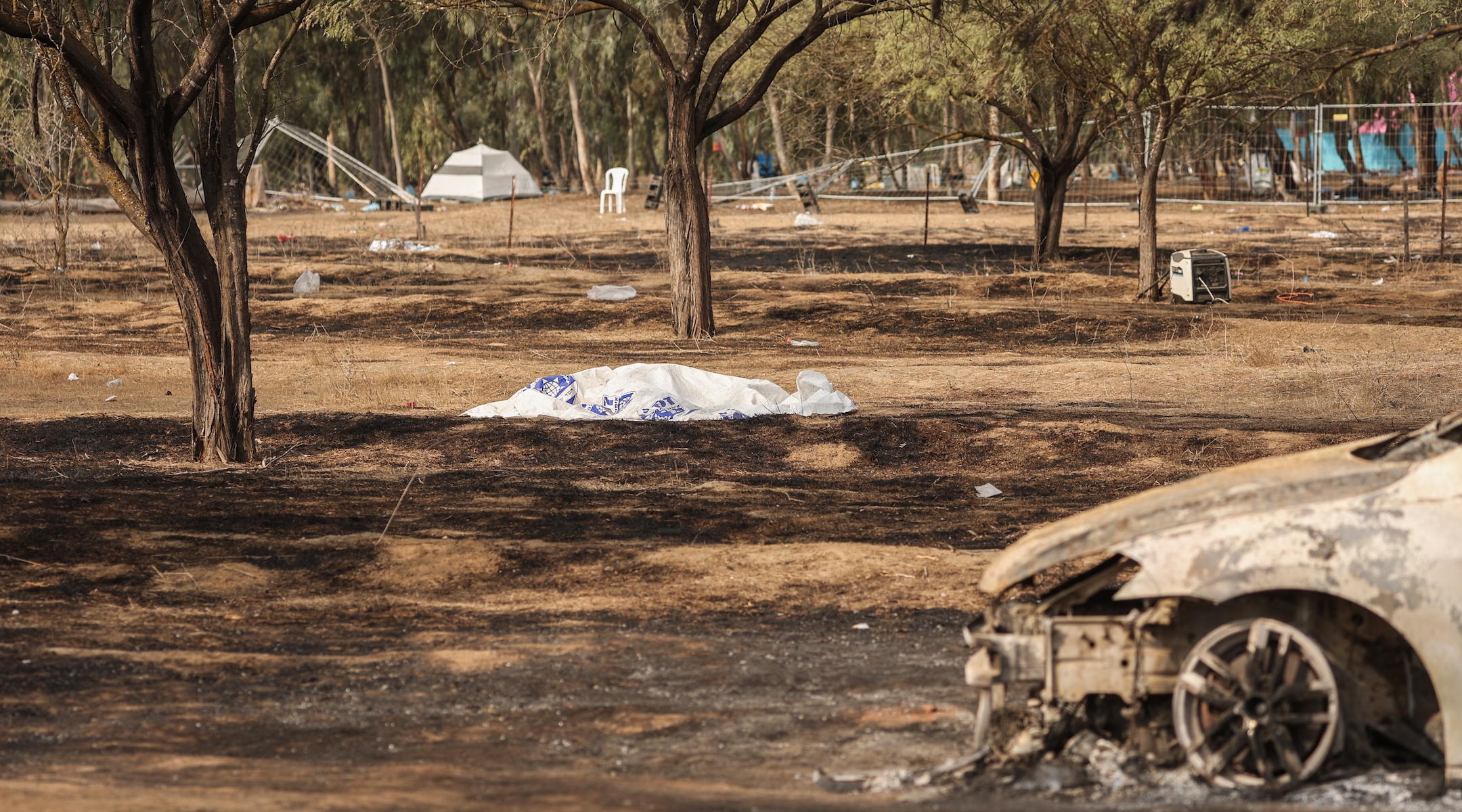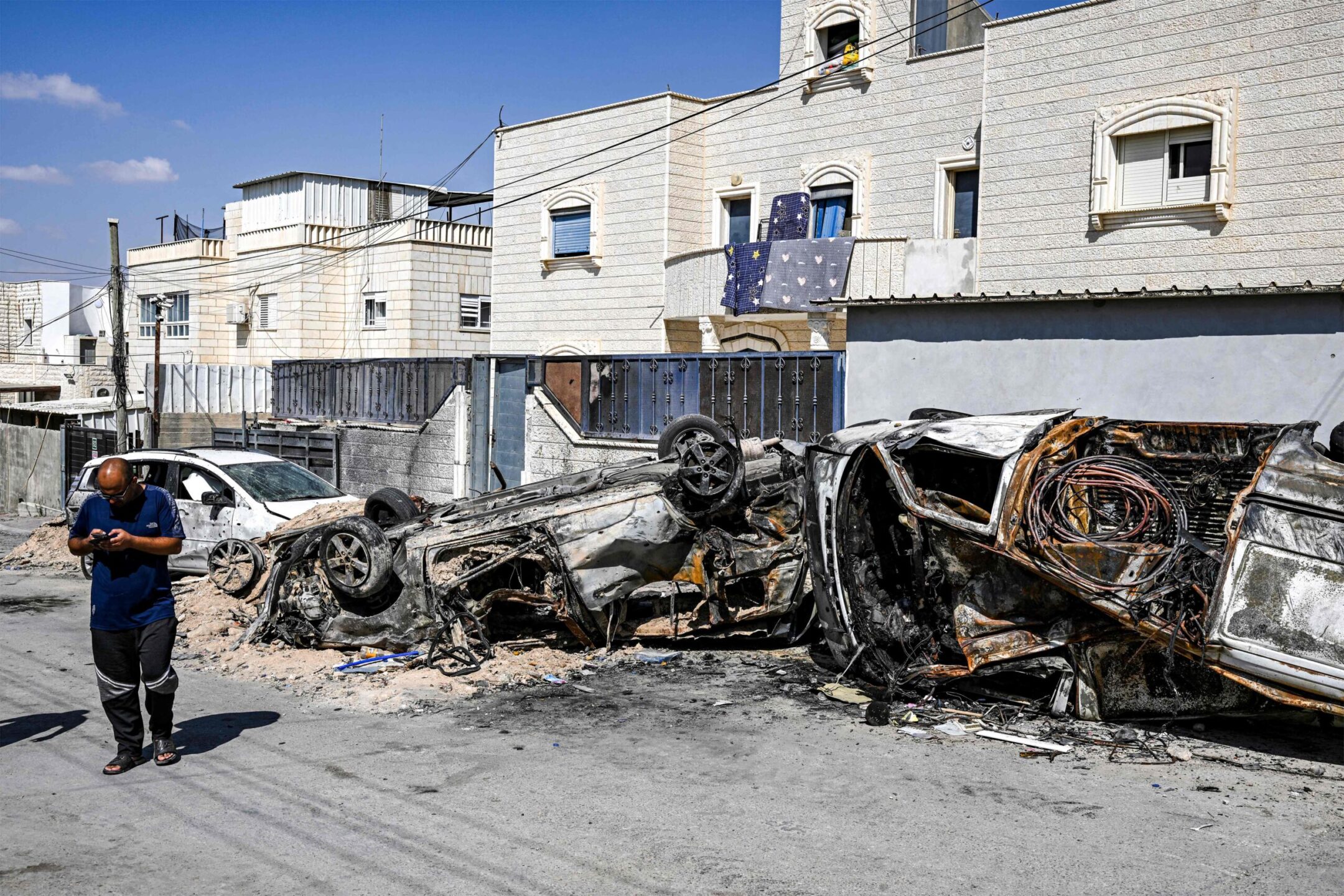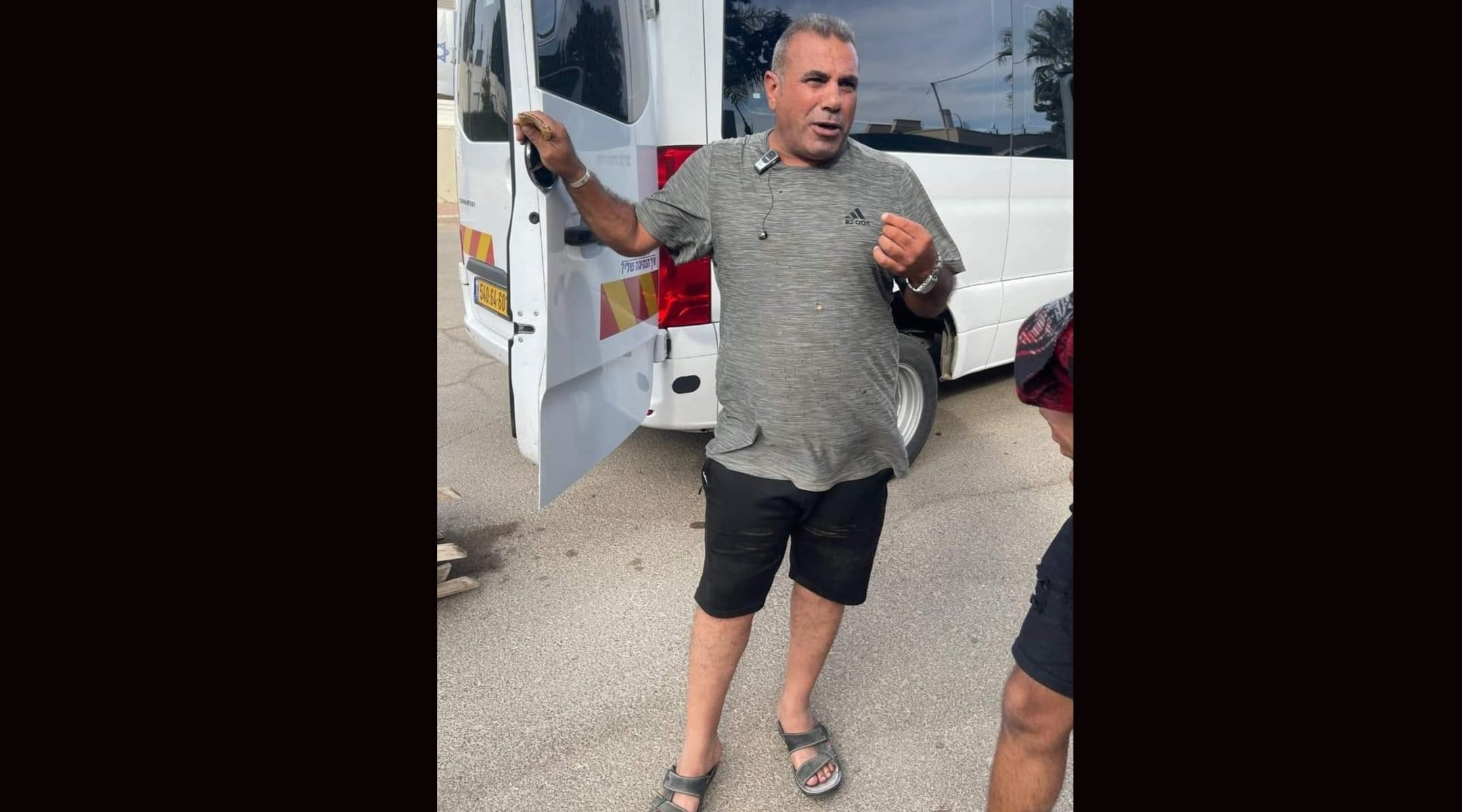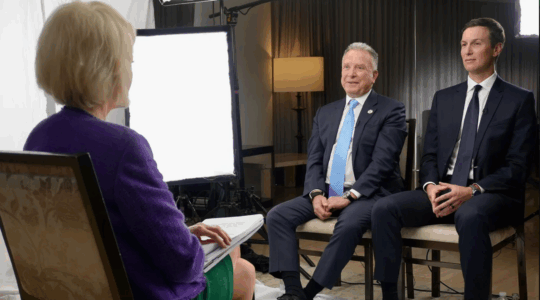(JTA) — Every day at 4 p.m., Youssef Ziadna receives a phone call from a psychologist. Every evening, he sits on his balcony drinking coffee, smoking, and replaying in his mind the worst things he has ever seen.
The daily routine would have been unimaginable for Ziadna, a 47-year-old Bedouin Israeli resident of Rahat, just two weeks ago. A minibus driver, he filled his days ferrying passengers around Israel’s southern region.
But on Oct. 7, he was called to pick up one of his regular customers and raced headlong in Hamas’ brutal attack on Israel. He ended up rescuing 30 people, all Jewish Israelis, from the massacre at the outdoor party near Israel’s southern border, dodging bullets and veering off-road to bring them to safety.
“I would never wish on anyone to see what I saw,” Ziadna told the Jewish Telegraphic Agency. “This is trauma for my whole life. When I sit alone and recollect, I can’t help the tears.”
Ziadna has joined an emerging pantheon of heroes who were able to carry out daring feats of rescue during a chaotic, dangerous and bloody attack in which thousands of Israelis were killed, wounded or taken captive. One of the people he saved posted about him on social media shortly afterwards.
Ziadna is “a larger-than-life man to whom we will forever be indebted,” Amit Hadar wrote in Hebrew in a post that was shared widely starting on Oct. 7. “When, with God’s help, we reach better days, save the number for the next time you need a ride — if anyone deserves it, this person does.”
Yet at the same time, Ziadna is grieving a cousin who was murdered during the attack and worrying about four other family members who remain missing. He also received a threat from someone who claimed to be affiliated with Hamas, vowing retaliation for Ziadna’s efforts to save Jews after they were recounted in a local newspaper. And he is concerned that his fellow Bedouins, a minority that remains marginalized in many ways within Israeli society, are at risk given the lack of bomb shelters in Rahat.
The stress of it all has already sent him to the emergency room with chest pains — but he is determined to press on.
“When I think about it, I ask how did we get out of there,” Ziadna recalled Monday, 10 days after the massacre. “I guess it’s fate that we’re meant to live longer in this world.”
Ziadna started Oct. 7 early, driving Hadar and eight of his friends from the town of Omer to the rave at Kibbutz Re’im at 1 a.m. He left with the instruction to pick them up the following day at 3 p.m.
But at 6 a.m. he received a call for help from Hadar. Believing that the call for help was due to a code red for incoming rockets fired from Gaza, Ziadna raced to his bus.
“I didn’t wash my face, I didn’t even get dressed,” Ziadna said. “This is standard over here in the south.”

A dead body on the grounds of the Tribe of Nova music festival after the Oct. 7, 2023, deadly attack by Hamas. (Ilia Yefimovich/picture alliance via Getty Images)
But as soon as he reached the Sa’ad junction, a mile away from Kfar Aza, one of the Gaza border communities that experienced some of the worst horrors of the Oct. 7 massacre, a new picture began to emerge. A man who had escaped from the party ran towards him, furiously signaling to Ziadna to make a U-turn. Ziadna, not comprehending, exited the minibus to speak to him. Moments later, Ziadna, the man and a woman who accompanied him were caught in gunfire.
“Bullets were flying everywhere,” Ziadna said, adding that the three dived into a ditch on the side of the road. He said, “I raised my head and the guy told me, ‘Why are you doing that? You’ll get a bullet in your brain!’”
Ziadna told the disbelieving couple that he would continue on to the site of the party. “I stared death in the face,” he said. “But I knew I couldn’t give up on my missions. I will go and rescue them.”
Navigating through bullet fire, Ziadna managed to reach his passengers at the scene of the party in Re’im where an inferno of bodies, blood and bullets reigned. “I told them to bring as many as possible,” he said. Twenty-four additional people crammed into the 14-seater vehicle, and on the way, they rescued another couple, one of whom had been shot in the leg. Ziadna says he also caught sight of a motorized Hamas paraglider hovering above, spraying bullets with a machine gun at revelers.
Under constant gunfire, the minibus sped away. Ziadna’s intimate knowledge of the terrain proved lifesaving, and he was able to cut a route through dirt roads, avoiding the main thoroughfare where terrorists were ambushing escapees. Many other cars took his lead and followed the minibus, he said.
Cries of terror and anguish filled his minibus as its occupants nursed their wounds and tried desperately to call loved ones amid jammed cellular signals. They arrived at a roadblock manned by police. Saying there was no way of getting to the hospital to treat the wounded woman because the route was overrun with terrorists, an officer directed them to a nearby kibbutz, Tze’elim, where they remained until the late afternoon when the Home Front Command finally said it was safe to leave.
Hadar confirmed Ziadna’s account but declined to speak further to JTA.
Four hundred people from the party took refuge in the kibbutz and, according to Ziadna, were looked after well. “They gave us everything we needed, food, chargers and even cigarettes,” he said.

A member of the Bedouin community stands next to vehicles destroyed by a rocket fired from the Gaza Strip in the village of Arara in the Negev Desert, Oct. 14, 2023. (Yuri Cortez/AFP via Getty Images)
Finally, Ziadna made it back to Rahat where his home, like the overwhelming majority in the city, has no reinforced safe room. Home to 75,000 Bedouins, Rahat has only 10 public bomb shelters — a fact that its mayor, Ata Abu-Madighem, has lamented for years. On Tuesday, Abu-Madighem filed a request for 60 mobile shelters.
According to Abu-Madighem, who met with Ziadna to thank him several days after the attack together with representatives from the army and the police, three Rahat residents were killed on Oct. 7, two of whom were the mayor’s relatives. One was Ziadna’s: Abed Ruhman was murdered by Hamas terrorists while sleeping in a tent on Zikim beach, Ziadna said.
Seven people from Rahat were wounded, including a second-grader who was shot in the chest. A further five are reported missing, four from the Ziadna family, Abu-Madighem said. (The hundreds of known hostages in Gaza include Bedouins, and Hamas has also been holding an Israeli Bedouin, Hisham al-Sayed, captive since 2015, when he wandered by foot into Gaza.)
The biggest risk, the mayor said, is to those who live in unrecognized tent villages in the region, which have no protection at all from projectiles.
“The state must make a mental switch and start respecting the Bedouin community. It’s also foolish to continue to refuse to plug into the massive manpower we have here,” he told JTA.
Ziadna hopes his actions will prompt greater appreciation and support for the Bedouin community. “After this, the government needs to do a better job of looking after us because we’re also part of this nation,” he said. “We are one people — we are Israelis. We live here together and we need to go hand in hand.”
For now, he is seeking to bolster his mental health and to put aside concerns about the death threat he received. “He told me, ‘You saved 30 Jews’ lives. I’m from Gaza but don’t worry, we’ll get to you,’” Ziadna recounted.
Abu-Madighem confirmed the call to JTA and Ziadna said the Israel Police are investigating its source; police spokespeople did not respond to requests for comment. Other Israeli Arabs who have gained public attention for helping Jewish victims of the attack have faced retribution alongside plaudits.
More substantial than the threats, Ziadna said, have been an overwhelming number of messages of support, which he said have come from all over the world. He made a public appearance alongside Yair Golan, a retired general and former lawmaker who engaged in feats of rescue of his own. He has also been invited by Israel’s embassy in Dubai to tell his story to an Emirati audience.
There, he will share a story that could easily have ended in tragedy.
“I had an option to go back. A weaker man may have done a U-turn at that junction,” Ziadna said. “But I said no way, I will throw myself at death if it means I can save lives.”
JTA has documented Jewish history in real-time for over a century. Keep our journalism strong by joining us in supporting independent, award-winning reporting.






